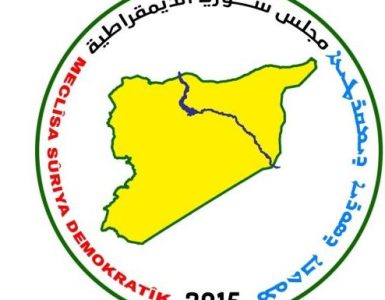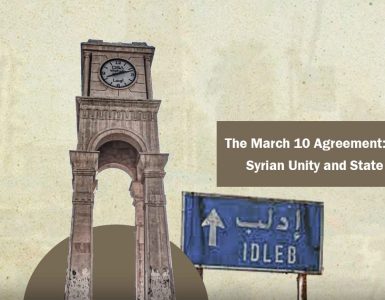By Layla Mousa
As the painful anniversary of the “Night of Treachery” massacre in Kobani approaches, we recall a tragedy that remains deeply etched in memory. On that night, dozens of innocent civilians—women, children, and the elderly—were brutally killed while sleeping peacefully after dawn prayers. Even though a decade has gone by since the tragedy occurred, the emotional pain, trauma, and sense of injustice caused by it have not healed. The massacre marked a dark chapter in the history of humanity. It revealed the extent of the complicity and support that extremist and terrorist forces received from multiple actors. These actors exploited terrorism as a tool to advance their expansionist agendas.
The recent attack on St. Elias Church in the al-Dweilaa neighborhood of Damascus is not disconnected from that same mentality. Although the location has changed, the nature of the violence remains the same. It is still terrorism, driven by the same exclusionary, fanatical mindset. Innocent lives continue to be targeted with complete disregard for human dignity. The ideology behind such crimes does not change, even if its methods or perpetrators vary.
Kobani has since become a symbol of resistance and victory over terrorism. It reflects the genuine will of the Syrian people to confront darkness and extremism. Even when time passes, truth remains valuable and relevant—it doesn’t lose its importance or validity. As long as there are people brave enough to stand up for it, the truth will survive, be remembered, and possibly bring justice. Kobani also showed us that absent justice can never be recovered without fair and transparent accountability. Those responsible for the tragedy—whether through direct involvement or silent complicity—must be held to account if we are ever to achieve true justice.
Also: Centralized Power: Monopoly Disguised as Unity
The bombing that targeted the church—ten years after the Kobani massacre—reaffirms a painful reality: the absence of accountability and justice remains the norm. It also highlights that international engagement with the issue of terrorism continues to lack seriousness. Had the perpetrators of the Kobani massacre, along with those who supported them, been held accountable at the time, we might not have witnessed subsequent tragedies like the events happened in the coastal regions of Syria or the bombing in al-Dweilaa.
Relying solely on security and military measures to confront extremist ideologies cannot yield lasting success. Ideas cannot be silenced with weapons. They must be confronted through an alternative intellectual project—one that addresses the deep-rooted causes of extremism and offers a new vision for coexistence and shared life.
The Syrian revolution, which was launched in pursuit of freedom and dignity, was exploited by forces that turned it into a battleground for their own interests. These forces imposed their agendas at the expense of the Syrian people. The same exclusionary mindset that dismantled the state and fragmented society is still at work today. It continues to manifest through projects fueled by ethnonationalist or Islamist impulses—both of which ultimately lead to repression and authoritarianism, even if they differ in form and rhetoric.
What complicates the current landscape further is the ongoing effort to revive certain groups previously linked to terrorism. These groups are being assigned roles within provisional institutions that are presented as national initiatives. While such tactics may seem pragmatic, they overlook a critical truth: extremist ideology is built on a mental framework that categorically rejects and excludes other ideologies. Trying to include or control extremist ideology (or the groups based on it) is just unrealistic hope and naive.
The lack of an official mourning declaration following the church bombing exposes a deeper issue in the political and moral consciousness of certain actors. Although the transitional government issued a statement of condolence, the limited nature of the official response led Patriarch John X to declare a period of mourning himself. His declaration was not only for the victims, but also served as a symbolic expression of the state’s failure to protect civilians.
What Syria needs today is not symbolic gestures but a genuine transformation in the system of governance. This transformation must ensure good governance and fair participation for all Syrians—without discrimination or marginalization. Unless a new chapter is opened—one based on justice, accountability, and democracy—the revolution will persist, even if in different forms.
Also: Rebuilding Syria’s Political Process and Defining the SDC’s Role is Crucial
The desired transformation cannot be achieved without a profound intellectual and moral revolution that precedes political change.
There must be a serious re-evaluation of entrenched concepts. A critical review is needed of all that has been produced over the past years in order to correct the course and restore Syria to its natural role and status—both regionally and internationally.
The first step must focus on engaging a serious and inclusive intra-Syrian dialogue. Such a dialogue should lead to the development of a national project that truly represents all Syrians. Only then can external interventions be effectively blocked.
At that point, we can begin to say with confidence that Syria is on the right path toward a new future—one free from the roots of extremism and platforms of hate.
Syria’s security is the cornerstone of stability in both the region and the wider world, and this truth cannot be ignored. If people do not carefully and honestly look at the true situation in Syria, then the existing power and political system will continue unchanged. In other words, ignoring or avoiding the real problems will only keep things the same and stop any real progress or change. It will increase the risk that authoritarian rule will come back—this time in a new, more dangerous form. A form that may be disguised under the pretext of fighting terrorism, while in fact reviving it in other ways.





